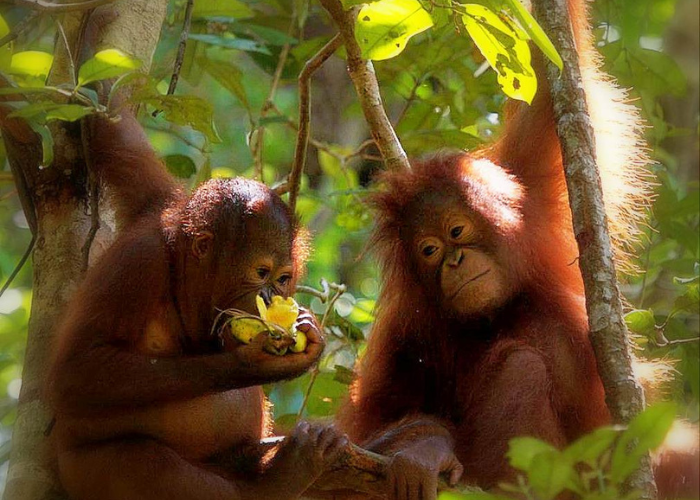Protecting Orangutans: A Call to Environmental ResponsibilityBY MICHELLE DESILETS
- 19 August 2023
- Posted by: Competere
- Categories: highlights, News, Sustainable Nutrition

International Orangutan Day is celebrated every year on 19 August. It represents an opportunity to raise awareness about the orangutan and its rainforest habitat, as well as to encourage actions people can take to help protect them.
DISTRIBUTION AND CONSERVATION STATUS
Historically, orangutans ranged from the foothills of the Himalayas to the island of Java. Today, orangutans live only in Malaysia and Indonesia, specifically on the islands of Borneo and Sumatra. There are 3 species of orangutans: the Bornean, the Sumatran and the Tapanuli (the Tapanuli was only identified as a distinct species in 2107). All three species are considered Critically Endangered by the International Union for Conservation of Nature (IUCN), and the Tapunuli, numbering only about 800 individuals, is the most endangered Great Ape on the planet.
THREATS TO ORANGUTANS
The main threats to orangutans are hunting and the conversion of their habitat, mostly to oil palm. Mining is increasingly posing a threat to orangutans in many regions. Wildfires, which engulf the region annually, especially during El Nino years, can wipe out large areas of orangutan habitat. Some of these fires are set deliberately to clear land in preparation for planting oil palm and other crops. The illegal capture and trade of orangutans has also played a part in lowering their numbers in the wild.
THE ROLE OF PALM OIL IN THE DECLINE OF THE ORANGUTAN POPULATION
The conditions which make the habitat ideal for orangutans are the same conditions which make the region ideal for the cultivation of oil palm: a tropical climate with plenty of rain. Malaysia and Indonesia fit the bill perfectly. And it just so happens that these two countries account for close to 90% of the global production of palm oil. As a result, outside of protected areas, orangutan habitat has been hugely fragmented by the expansion of oil palm. This fragmentation leads to orangutan populations being broken up and isolated, preventing the exchange of genetic material in order to maintain viable populations. With their forest habitat depleted, many orangutans will starve. In search of food, some will venture into community farms as well as plantations, where they may become victims to Human Wildlife Conflict.
The palm oil issue is a complex one. And to address complex issues successfully, it is important that research and science play a part. Understanding precisely where orangutans and oil palm overlap and how orangutans behave and adapt to these fragmented landscapes is critical to developing sustainable and impactful solutions.
A few years ago, the scientists at Borneo Futures discovered that 10,000 orangutans live in areas allocated for industrial oil palm in Borneo alone. This revelation makes it clear that the strategy of trying to remove orangutans from oil palm landscapes to place in rehabilation centres or to move to other forests is not tenable. The fact is, orangutans are found in vast numbers in these landscapes, and so we support ways to develop resilient landscapes for both people and wildlife.
Dr Marc Ancrenaz’s research in the highly fragmented Kinabatangan landscape in Sabah shows that orangutans can and do move across oil palm estates. Although they cannot survive exclusively on the fruit of the oil palm or the shoots of young palms, they can manage if they can find safe patches of forest along the way with a variety of food sources. Research has shown that orangutans can do well in selectively logged, secondary forests as well. “Basically,” as Dr Ancrenaz describes it, “large terrestrial species like orangutans and elephants that find themselves in these landscapes need 3 things to survive: sufficient food resources, space to move and find mates, and to not be killed.”
SOLUTIONS
It is undeniable that the impact of the unsustainable development of oil palm plantations on orangutans has been catastrophic. If we want to save orangutans, the single-most important thing we can do is ensure that palm oil is produced and consumed sustainably. In most basic terms, sustainable palm oil is that which does not involve deforestation, the conversion of peat, or exploitation of people. The details of what needs to be demonstrated in order to become certified as a sustainable palm oil grower are much more extensive and comprehensive and are outlined in the Roundtable for Sustainable Palm Oil (RSPO) Principles and Criteria.
To begin with, under RSPO, growers are not permitted to clear forests or to develop on peatlands. Orangutans thrive in peatland swamp forests. Growers are also required to conserve or enhance areas of High Conservation Value (which include the presence of rare, threatened or endangered species like the orangutan.) Additionally, growers are responsible for ensuring that rare, threatened or endangered species not be captured, harmed or killed. Growers are encouraged to not only create and protect safe havens for orangutans, but to collaborate with stakeholders, including other land-users, to develop wildlife corridors to allow the safe passage of large species like orangutans and elephants.
SHARED RESPONSIBILITY
WHAT CAN CONSUMERS DO?
WHY NOT JUST BOYCOTT PALM OIL OR GO “PALM-FREE”?
A blanket boycott of palm oil is no solution. Palm oil is here to stay. It’s the most widely-consumed edible oil in the world and it can be found in about half of packaged goods in the supermarket. The demand for all edible oil crops continues to rise, and palm oil, the highest yielding of these crops, is both versatile and ubiquitous. If a blanket boycott of palm oil which fails to distinguish between conventional and sustainable palm oil were to actually take hold and result in lowered production of palm oil, then other lower-yielding crops would take its place. In places like the tropics, replacing oil palm with these other crops would only multiply the risk to the remaining rainforests and the biodiversity within them. It’s for this reason that leading conservation experts and NGOs do not support “Palm-free” options. “Palm-free” suggests that all palm oil is unsustainable and falsely leads consumers to believe alternative oils are better. The best alternative to palm oil is sustainable palm oil.
This International Orangutan Day, why not make a commitment to save orangutans EVERY day, by supporting sustainable palm oil?
ABOUT ORANGUTAN LAND TRUST
Orangutan Land Trust works to enable sustainable solutions for the long-term survival of the orangutan in the wild. In addition to our work to drive sustainable palm oil value chains, we fund vital conservation activities in the field, including forest protection and reforestation, fire prevention and fire-fighting, peatland restoration, research and orangutan surveys, orangutan rescue and relocation and community engagement. Find out more about us at www.forests4orangutans.org.
.

